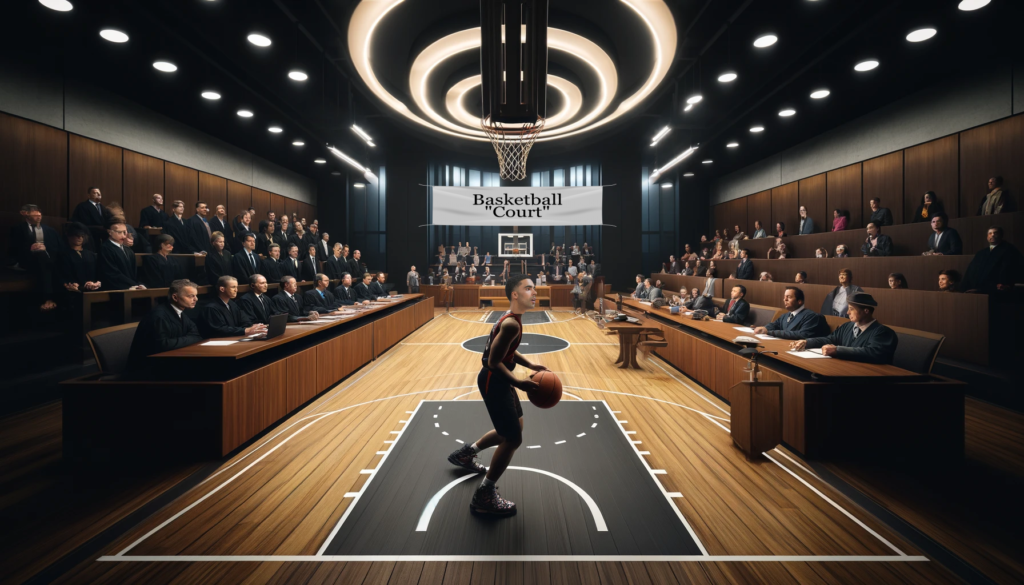In this week’s GME3 we’re taking a look at the most recent update in the Jontay Porter match-fixing scandal, new legislation out of New York that aims to protect young social media users from the addictive nature of the “content feed,” and a new provision from the CRTC that is causing a ruckus among international streaming platforms like Netflix or Disney+. Read the full stories below!
Gambling
Betting Brouhaha: Court Calls Foul
Earlier this week a New York man was charged in relation to the sports betting scandal that resulted in a lifetime ban for former Toronto Raptor Jontay Porter. While Porter is not specifically named in the court filings, there are references to a “Player 1” whose specifics seem to match up with Porter.
In the complaint, it was alleged that Player 1, along with the various co-conspirators participated in a “brazen, illegal betting scheme that had a corrupting influence on two games and numerous bets.” As part of this, Player 1 directly communicated with Long Phi Pham, who was named in the complaint, and other co-defendants whose identities have been redacted.
When the news about the scandal originally broke and it became clear that the NBA would have to open an official investigation into the matter, Player 1 sent a message warning Pham and others that they “might just get hit w a rico” and reminding them to delete “all the stuff” from their phones.
The complaint further alleges that Player 1 had significant gambling debts owed to at least one alleged conspirator, and was encouraged to settle them by purposefully bowing out of games so that wagers would pay out to those who knew in advance. This seems to be confirmed in another recovered message from earlier this year where Player 1 said “If I don’t do a special with your terms. Then it’s up. And u hate me and if I don’t get u 8k by Friday you’re coming to Toronto to beat me up.” Player 1 went on to tell Pham and one other defendant that he planned to exit a January 26th game early, citing an aggravated eye injury. This matches up exactly with what Porter ended up doing, leaving a game with the Clippers after only playing 4 minutes and 24 seconds, exiting with stats far below what sportsbooks predicted.
Two months later the same pattern repeated – Player 1 planned to leave a March 20th game early, and Porter followed through, exiting the game against the Sacramento Kings after only 2 minutes and 43 seconds with statistics far short of the betting line. Some defendants made a combined total of over $1 million on their “under” bets on Porter
Federal prosecutors have declined to confirm whether Porter is also under investigation, but we do know that the NBA is sharing all findings with investigators. Stay tuned for any future developments as this case continues to unfold!
Media
“SAFE”guarding Kids’ Feeds
New York lawmakers are finalizing legislation that would allow parents to block their children from getting social media posts curated by a platform’s algorithm. New York’s Stop Addictive Feeds Exploitation (SAFE) For Kids Act aims to reign in the addictive nature of certain feeds that some critics allege have been designed to keep young users glued to their phones.
Democratic Governor Kathy Hochul and Attorney General Letitia James have been advocating for these regulations since October of last year, but have faced severe pushback from social media companies. To combat this, they have amended the legislation to remove a provision that would limit the time that children were allowed to spend on social media platforms. Lawmakers in Albany are working hard to get the new law passed before the legislative session ends this week.
Supporters of the bill argue that it would help protect the mental health and development of young people by shielding them from features designed to keep them endlessly scrolling. This will be accomplished by eliminating the curated content that is automatically pushed to your feed and limiting young users to seeing content from creators that they already follow. The bill makes no effort to moderate the content itself, only the mechanism through which it’s delivered.
Critics of the bill argue that it would actually make things worse for youth by forcing social media platforms to gather even more information about users than they already do. Albert Fox Cahn, executive director of the Surveillance Technology Oversight Project, alleges that “there simply is no technology that can prove New Yorkers’ ages without undermining their privacy.”
Furthermore, tech industry advocacy groups, like NetChoice, have argued that the bill would violate the First Amendment by “requiring websites to censor the ability of New Yorkers to read articles or make statements online, by blocking default access to websites without providing proof of ID and age, and by denying the editorial rights of webpages to display, organize, and promote content how they want.” If the bill passes, companies could be fined up to $5,000 per violation.
Entertainment
Stream and Shout
The Canadian Radio-television and Telecommunications Commission (CRTC) has announced that online streaming services that operate in Canada will be required to contribute 5% of their Canadian revenue to support the domestic broadcasting system and boost funding for local and Indigenous-run broadcasting.
This change comes as part of a broader law passed last year that was designed to ensure that big, international streaming platforms, like Netflix or Amazon, are still contributing to Canadian programming.
Supporters of the bill claim that it will ultimately be to the benefit of Canadian audiences, by promoting stories that reflect Canadian experiences more closely. However, critics are concerned over who will end up really footing the bill. Streaming services could very well end up increasing subscription fees to compensate for the 5% that they’re losing out on. Furthermore, the CRTC has (so far) failed to provide an adequate definition of what “Canadian content” even is. If the definition is too vague, then we have no way to ensure that beneficiaries of the fund are creating work that meets the standard.
So far, Netflix, Disney+, and Amazon Prime Video have all released statements conveying their disappointment at the change, citing a potential “negative impact” for Canadian users and some even going so far as to say the change will make it more difficult to work with Canadian creatives.
GME Law is Jack Tadman, Zack Pearlstein, Lindsay Anderson, Daniel Trujillo, and Will Sarwer-Foner Androsoff. Jack’s practice has focused exclusively on gaming law since he was an articling student in 2010, acting for the usual players in the gaming and quasi-gaming space. Zack joined Jack in September 2022. In addition to collaborating with Jack, and with a keen interest in privacy law, Zack brings a practice focused on issues unique to social media, influencer marketing, and video gaming. Lindsay is the most recent addition to the team, bringing her experience as a negotiator and contracts attorney, specializing in commercial technology, SaaS services, and data privacy.
At our firm, we are enthusiastic about aiding players in the gaming space, including sports leagues, media companies, advertisers, and more. Our specialized knowledge in these industries allows us to provide tailored solutions to our clients’ unique legal needs. Reach out to us HERE or contact Jack directly at jack@gmelawyers.com if you want to learn more!
Check out some of our previous editions of the GME3 HERE and HERE, and be sure to follow us on LinkedIn to be notified of new posts, keep up to date with industry news, and more!




